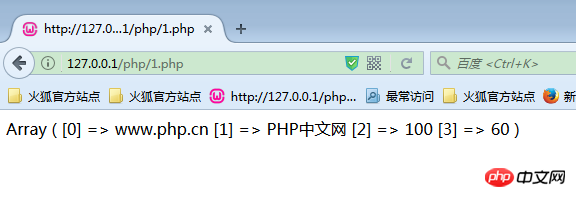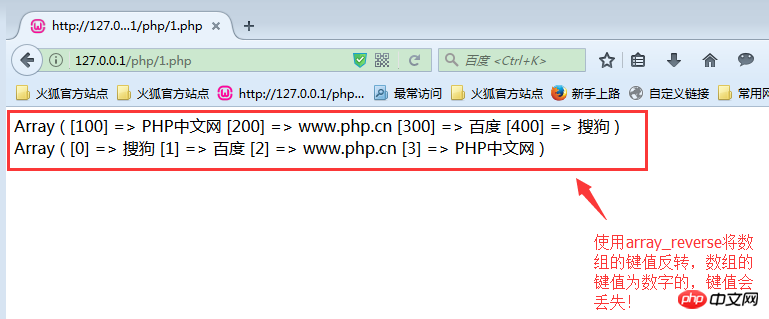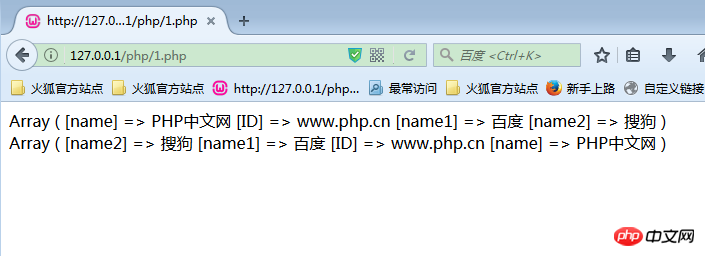 Backend Development
Backend Development
 PHP Tutorial
PHP Tutorial
 Detailed explanation of examples of random shuffling and reverse ordering of PHP arrays
Detailed explanation of examples of random shuffling and reverse ordering of PHP arrays
Detailed explanation of examples of random shuffling and reverse ordering of PHP arrays
Random shuffling and reverse order of PHP arrays
In the first two articles "How to sort PHP arrays" and " PHP Array Reverse Order" introduces two sets of functions, one in ascending order and one in reverse order (descending order). Today, in this article, we will introduce to you the random order and reverse order of arrays!
1. What is random disorder? (shuffle)
#shuffle is to disrupt the array.
Use the shuffle function to randomly sort the elements in the array.
The shuffle syntax structure is as follows:
bool shuffle ( array &$array )
| Parameters | Description |
| array | Required. Specifies the array to adapt to. |
This function scrambles (randomly arranges the order of cells) an array. It uses a pseudo-random number generator and is not suitable for cryptography situations.
shuffle instance usage:
Let’s take an example to explain the shuffle function in detail. The specific code is as follows:
<?php
header("Content-Type:text/html; charset=utf-8");
$arr=array("name" => "PHP中文网", "url" => "www.php.cn", "tom" => "100","hank" => "60");
shuffle($arr); // 将数组的值随机排序
print_r($arr);
?>The output result is:

The above example will output different results every time you refresh the browser. I won’t take more screenshots here. You can try it locally!
Note: After the associative array is shuffled, the keys will be lost, as you should be able to see from the above example!
2. What is reverse order? (array_reverse)
array_reverse — Returns an array with the reverse order of the cells. Reverse order is to reverse the order of each element in an original array,
The syntax format of array_reverse is as follows:
array array_reverse ( array $array [, bool $preserve_keys = false ] )
array_reverse() accepts array array as input and returns a new array with the cells in reverse order. If preserve_keys is TRUE, the original key names are retained.
Instructions:
1. Reverse order ≠ Descending order
2. If The array is an associative array
When the key is a character, the reverse order will not be affected, the key will still be retained
When the key is a number, after the reverse order The default keys will be reset to 0, 1, 2...
When the second parameter is true, the keys are numbers, and the numeric keys are retained in reverse order
Let’s look at the example code of when the key is a number:
<?php
header("Content-Type:text/html; charset=utf-8");
$arr=array("100" => "PHP中文网", "200" => "www.php.cn", "300" => "百度","400" => "搜狗");
$array = array_reverse($arr);//数组反序,将数组的元素反转
print_r($arr);
echo "<br>";
print_r($array);
?>The output result is:

The key is Keep the key value when numbersSample code:
<?php
header("Content-Type:text/html; charset=utf-8");
$arr=array("100" => "PHP中文网", "200" => "www.php.cn", "300" => "百度","400" => "搜狗");
$array = array_reverse($arr,true);//数组反序,将数组的元素反转
print_r($arr);
echo "<br>";
print_r($array);
?>The output result is:

As can be seen from the above code, the key is When numbers are used, the key value is retained, which means the second parameter of array_reverse is true!
The key is when the key is a characterSample code:
<?php
header("Content-Type:text/html; charset=utf-8");
$arr=array("name" => "PHP中文网", "ID" => "www.php.cn", "name1" => "百度","name2" => "搜狗");
$array = array_reverse($arr);//数组反序,将数组的元素反转
print_r($arr);
echo "<br>";
print_r($array);
?>The output result is:

array_reverse function When the array is reversed, if the key value is a string, the key value will be retained!
Note: When using the array_reverse function, the original array will not be affected, and a new array will be returned!
In this article we introduce the reverse order and disorder of the array. In the next article, we will introduce the equal division, replacement and interception of arrays. For detailed introduction, please read "Interception, equal division and replacement of partial arrays of PHP arrays"!
【Related tutorial recommendations】
Related topic recommendations: "php array (Array)"
Related video course recommendations: "Other array functions: array_rand()/array_sum()/shuffle()/range()》
The above is the detailed content of Detailed explanation of examples of random shuffling and reverse ordering of PHP arrays. For more information, please follow other related articles on the PHP Chinese website!

Hot AI Tools

Undresser.AI Undress
AI-powered app for creating realistic nude photos

AI Clothes Remover
Online AI tool for removing clothes from photos.

Undress AI Tool
Undress images for free

Clothoff.io
AI clothes remover

AI Hentai Generator
Generate AI Hentai for free.

Hot Article

Hot Tools

Notepad++7.3.1
Easy-to-use and free code editor

SublimeText3 Chinese version
Chinese version, very easy to use

Zend Studio 13.0.1
Powerful PHP integrated development environment

Dreamweaver CS6
Visual web development tools

SublimeText3 Mac version
God-level code editing software (SublimeText3)

Hot Topics
 1376
1376
 52
52
 PHP 8.4 Installation and Upgrade guide for Ubuntu and Debian
Dec 24, 2024 pm 04:42 PM
PHP 8.4 Installation and Upgrade guide for Ubuntu and Debian
Dec 24, 2024 pm 04:42 PM
PHP 8.4 brings several new features, security improvements, and performance improvements with healthy amounts of feature deprecations and removals. This guide explains how to install PHP 8.4 or upgrade to PHP 8.4 on Ubuntu, Debian, or their derivati
 CakePHP Working with Database
Sep 10, 2024 pm 05:25 PM
CakePHP Working with Database
Sep 10, 2024 pm 05:25 PM
Working with database in CakePHP is very easy. We will understand the CRUD (Create, Read, Update, Delete) operations in this chapter.
 CakePHP Date and Time
Sep 10, 2024 pm 05:27 PM
CakePHP Date and Time
Sep 10, 2024 pm 05:27 PM
To work with date and time in cakephp4, we are going to make use of the available FrozenTime class.
 CakePHP File upload
Sep 10, 2024 pm 05:27 PM
CakePHP File upload
Sep 10, 2024 pm 05:27 PM
To work on file upload we are going to use the form helper. Here, is an example for file upload.
 Discuss CakePHP
Sep 10, 2024 pm 05:28 PM
Discuss CakePHP
Sep 10, 2024 pm 05:28 PM
CakePHP is an open-source framework for PHP. It is intended to make developing, deploying and maintaining applications much easier. CakePHP is based on a MVC-like architecture that is both powerful and easy to grasp. Models, Views, and Controllers gu
 CakePHP Creating Validators
Sep 10, 2024 pm 05:26 PM
CakePHP Creating Validators
Sep 10, 2024 pm 05:26 PM
Validator can be created by adding the following two lines in the controller.
 CakePHP Logging
Sep 10, 2024 pm 05:26 PM
CakePHP Logging
Sep 10, 2024 pm 05:26 PM
Logging in CakePHP is a very easy task. You just have to use one function. You can log errors, exceptions, user activities, action taken by users, for any background process like cronjob. Logging data in CakePHP is easy. The log() function is provide
 How To Set Up Visual Studio Code (VS Code) for PHP Development
Dec 20, 2024 am 11:31 AM
How To Set Up Visual Studio Code (VS Code) for PHP Development
Dec 20, 2024 am 11:31 AM
Visual Studio Code, also known as VS Code, is a free source code editor — or integrated development environment (IDE) — available for all major operating systems. With a large collection of extensions for many programming languages, VS Code can be c



